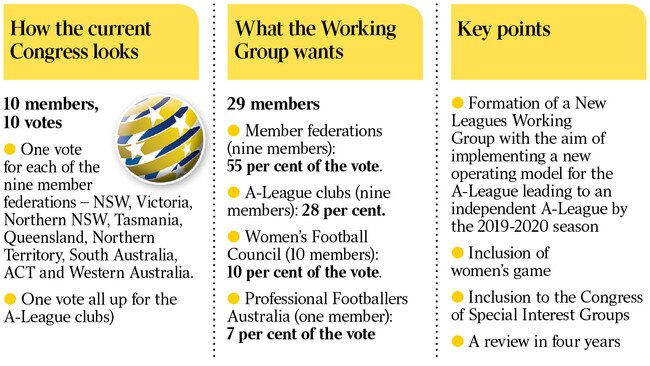FFA maintains fight against FIFA reforms
FFA appears determined to bunker down for the long haul in the fight to torpedo recommended reforms to the governance of soccer.

Football Federation Australia appears determined to bunker down for the long haul in the fight to torpedo recommended reforms to the governance of Australian soccer.
Commenting on yesterday’s release of the 100-page Congress Review Working Group report, FFA chairman Steven Lowy declared his board “regrettably considers the proposals as not in the interests of the game”.
It comes as sources suggested to The Australian that FFA had, in the past 48 hours, attempted to get the member federations to the negotiating table again.
After almost three years of rancour, claims, counter claims and backflips, the game moved a step closer to sorting out its ongoing governance issues with the release of the CRWG report, which was instigated by FIFA.
The recommendations, which would change the landscape of the sport in Australia, received widespread support from many levels of the game. The recommendations include:
• Taking the A-League from FFA and running it independently by the 2019-20 season;
• A new FFA voting congress that will see it grow from its present 10 members to 29 members;
• Provision for the inclusion of special interests groups, such a representation from National Premier League clubs, by 2019;
• Another review of the governance structure in four years time.
Under the proposals for changes to FFA’s Congress — which has the power to elect or fire members of FFA’s independent board — the membership would increase from 10 to 29 members.
The new-look Congress would see the member federations (nine members) have 55 per cent of the vote, the A-League clubs (nine members) 28 per cent, the Women’s Football Council (10 members) 10 per cent and Professional Footballers Australia (one member) seven per cent.
The PFA and the WFC would have a seat at the decision making table for the first time. However, the CRWG noted FFA’s opposition to an expanded congress and the independence of the A-League.
Among a raft of assertions, Lowy said the proposed Congress model “excessively weights votes towards professional football”, “allows professional football to dictate the election of directors to the FFA board” and delivers the PFA “a disproportionately greater voting representation than each member federation”.
In terms of the independent A-League model, Lowy suggested it was “inconsistent with the foundational good governance principle that independent directors should manage the affairs of FFA in accordance with their fiduciary duties”.
“Regrettably, the (FFA) directors consider the current CRWG proposals in relation to the new composition for the FFA Congress and the pathway to an alternative A-League governance model are not in the interests of the game,” Lowy said. “As such the directors would have no option but to recommend against their adoption.”
Lowy’s fighting words make it clear FFA remains on a collision course with FIFA, who are expected to rubber stamp the CRWG recommendations on August 20. The recommendations will then be put to a special meeting of the FFA Congress on September 7.
Indications are that at least two member federations — the ACT and Northern Territory — will side with FFA and attempt to derail the report. The Australian revealed recently that Tasmania and Northern NSW had also indicated they were opposed to some aspects of the recommendations though there are strong suggestions they are reconsidering their position.
If three of the member federations side with Lowy then the CRWG recommendations would be defeated.
But it is a situation fraught with danger, especially for Lowy and the FFA board as it would bring down the wrath of FIFA. While it has been suggested FIFA would sack the FFA board and bring in a normalisation committee to get the recommendations through, sources with FIFA experience have told The Australian that suspension is a more likely scenario.
That would be devastating for the game as it could see the Socceroos prevented from playing and banned from defending the Asian Cup and the Matildas stopped from playing internationals, including World Cup qualifiers.



To join the conversation, please log in. Don't have an account? Register
Join the conversation, you are commenting as Logout